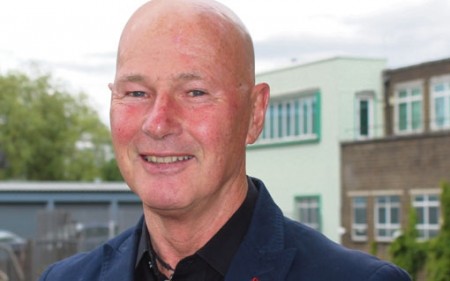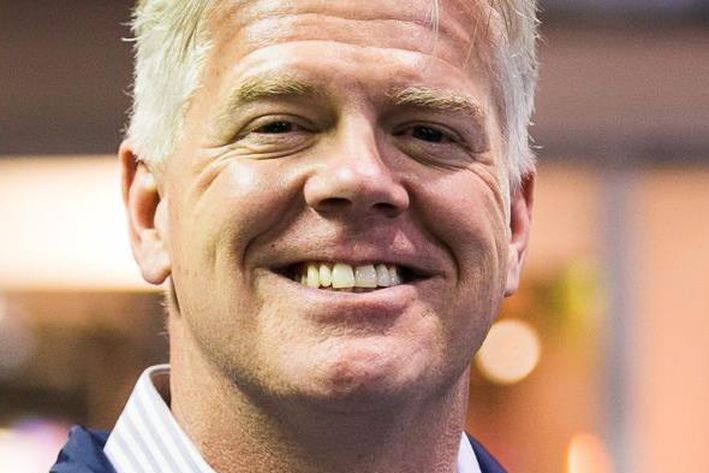Farewell to my friend, my mentor, and my colleague.
The Rev. John McNeill, an openly gay Roman Catholic priest who, from the 1970s onward, publicly pressed the church to welcome gay men and lesbians — and who was expelled from his order as a result — died on Tuesday in Fort Lauderdale, Fla. He was 90.

His death was announced by DignityUSA, an organization that supports gay, lesbian, bisexual and transgender Catholics. Father McNeill had helped found its New York chapter in 1972.
A Jesuit who was ordained in 1959, Father McNeill was known in the decades that followed as an author, activist and psychotherapist specializing in the needs of gay clients. He first came to wide, explosive attention in 1976 with the publication of his book “The Church and the Homosexual.”
That book was the first extended nonjudgmental work about gay Catholics, a subject that had long been taboo in official church discourse. It has been credited with helping to set in motion the re-evaluation of the religious stance toward gay people — not only among Catholics but also among those of other faiths — that continues today.
“John McNeill is one of the most important voices in the history of the L.G.B.T. civil rights movement,” Brendan Fay, the director of “Taking a Chance on God,” a 2011 documentary film about Father McNeill, said in a telephone interview on Friday. “ ‘The Church and the Homosexual’ became the primary text that is still considered the key in transforming the conversation on religion and homosexuality.”
For Father McNeill, the book, and his disclosure soon after its publication that he was gay, would lead to years of public opprobrium, censure by the church, exclusion from his order and, in the end, a newfound level of activism that sustained him to the end of his life.
“He was a gay man who was a Jesuit priest — and being a gay man who is a Jesuit priest, by the way, is not an unusual thing,” Mary E. Hunt, a Roman Catholic feminist theologian and longtime friend of Father McNeill’s, said on Friday. “The difference is that John McNeill was honest, and he was honest early. And being honest early meant that he paid a large price.”
“The Church and the Homosexual” drew on Father McNeill’s deep academic training in theology and, though only tacitly, on his own experience. In the book, he argued that a stable, loving same-sex relationship was just as moral, and just as godly, as a heterosexual one and should be acknowledged as such by church leaders.
After an extensive review of the manuscript by a panel of theologians, “The Church and the Homosexual” was published under the imprimatur of the Vatican.
Translated into several languages, the book caused an international sensation. In the United States, Father McNeill appeared on a spate of national television programs. In a 1976 interview with Tom Brokaw on the “Today” show, he publicly identified himself as gay.
“He’s the first priest to come out on national television,” Mr. Fay said.
At the time, Father McNeill described himself in interviews as a celibate gay man. It was a claim he made in public out of necessity: As it was, he was receiving stacks of hate mail, including death threats, from incensed strangers. In private, however, he was living with Charles Chiarelli, his lover since 1965.
John McNeill was born on Sept. 2, 1925, in Buffalo. When he was 4, his mother died; to rear him and his four older siblings, his mother’s sister married his father. In keeping with Old World tradition, they agreed to live celibately as brother and sister.
“We children grew up with the burden of our responsibility for our parents’ frustration and unhappiness,” Father McNeill wrote in his 1998 memoir, “Both Feet Firmly Planted in Midair: My Spiritual Journey.”
At 17, he enlisted in the Army and was assigned to the 87th Infantry. While serving in France, he was taken prisoner by the Nazis. Transported to a prisoner-of-war camp near Leukenwald, Germany, he was kept in a sealed boxcar for days without food or water. He licked frost from the boxcar nailheads until his tongue bled.
The Nazis endeavored to starve their prisoners to death; Mr. McNeill’s weight dropped to 80 pounds. One day, when their guard’s back was turned, a Polish captive threw Mr. McNeill a potato. When Mr. McNeill made a silent gesture of thanks, the Pole quietly made the sign of the cross.
“I always thought I wanted that kind of faith and that kind of courage,” Father McNeill said in Mr. Fay’s documentary. “To be ready to risk my life to help someone in need.”
After the war, he graduated magna cum laude from Canisius College in Buffalo and earned graduate degrees from Bellarmine College in upstate New York and Woodstock College in Maryland. In 1959, he was ordained by Cardinal Francis Spellman, the archbishop of New York.
Father McNeill began doctoral studies at the Catholic University of Leuven, in Belgium, in 1961. He was achingly lonely, he recalled, and considered suicide. Then he fell in love with another man.
“The experience of the joy and peace that comes with that — it was a clear indication to me that homosexual love was in itself a good love and could be a holy love,” Father McNeill said in the film.
After receiving his doctorate in philosophy in 1964, Father McNeill joined the faculty of Le Moyne College in Syracuse. Influenced by the Rev. Daniel Berrigan, he began protesting the Vietnam War.
By 1970, keenly aware of the self-hatred and depression that many gay Catholics experienced, he began ministering to them. He later trained as a psychotherapist at the Institutes of Religion and Health in New York.
He began speaking publicly on gay Catholic issues in the early 1970s, and in 1976 published “The Church and the Homosexual.”
Though the church had approved the book, it reneged over the next year, as Father McNeill became widely known as a gay-rights champion. In 1977, the Vatican ordered him not to speak or write publicly on the subject. Out of his deep fealty to his religion, and his feeling that the church needed time to come to terms with the issue, he agreed.
He obeyed the order for nearly a decade, though he continued quiet pastoral work with gay men and lesbians. Over time, however, two things spurred him to speak out, though he knew that in doing so he risked expulsion from his order.
The first spur was the AIDS epidemic, to which he increasingly turned his attention. With the Rev. Mychal Judge, Father McNeill, then living in New York, established an AIDS ministry, serving homeless people in Harlem. (Father Judge, a Roman Catholic priest who privately identified himself as gay, was killed in the Sept. 11 attack on the World Trade Center while aiding New York City firefighters.)
The second spur was an official document, “On the Pastoral Care of Homosexual Persons,” issued by the Vatican in October 1986. It was released above the signatures of Archbishop Alberto Bovone and Cardinal Joseph Ratzinger. Cardinal Ratzinger, then the head of the Vatican’s Congregation for the Doctrine of the Faith, would serve from 2005 until 2013 as Pope Benedict XVI.
The document, known as a pastoral letter, declared that homosexuality was “a more or less strong tendency ordered toward an intrinsic moral evil.”
In November, Father McNeill condemned the letter in a statement issued to The New York Times and The National Catholic Reporter. Cardinal Ratzinger responded by ordering him to keep silent on the subject, and to cease his pastoral work with gays and lesbians, or risk expulsion from his order.
Father McNeill demurred, and in early 1987, on the Vatican’s orders, he was expelled from the Jesuits. He was still nominally a priest, but for all practical purposes could perform few official priestly functions, including celebrating Mass.
Though the expulsion caused him great pain, Father McNeill said, it was liberating in other respects. He continued his psychotherapy practice and became more visible than ever as an activist. In 1987, he was the grand marshal of the New York City gay pride parade.
Father McNeill, who also taught at Fordham University and elsewhere, had lived in Fort Lauderdale in recent years. Mr. Chiarelli, whom he married in Toronto in 2008, is believed to be his only immediate survivor.
His other books include “Taking a Chance on God: Liberating Theology for Gays, Lesbians, and Their Lovers, Families and Friends” (1988) and “Freedom, Glorious Freedom: The Spiritual Journey to the Fullness of Life for Gays, Lesbians and Everybody Else” (1995).
His expulsion notwithstanding, Father McNeill “remained very much a Catholic throughout his life, remained very much a Jesuit in his orientation throughout his life, and remained very much a priest throughout his life,” said Dr. Hunt, the theologian.
This was perhaps never more starkly evident than at the end of his life, during his final hospital stay. On the door of his room, Mr. Fay said, hung a sign that had been placed there at Father McNeill’s request.
It read, simply, “I am a Catholic priest.”
Complete Article HERE!





